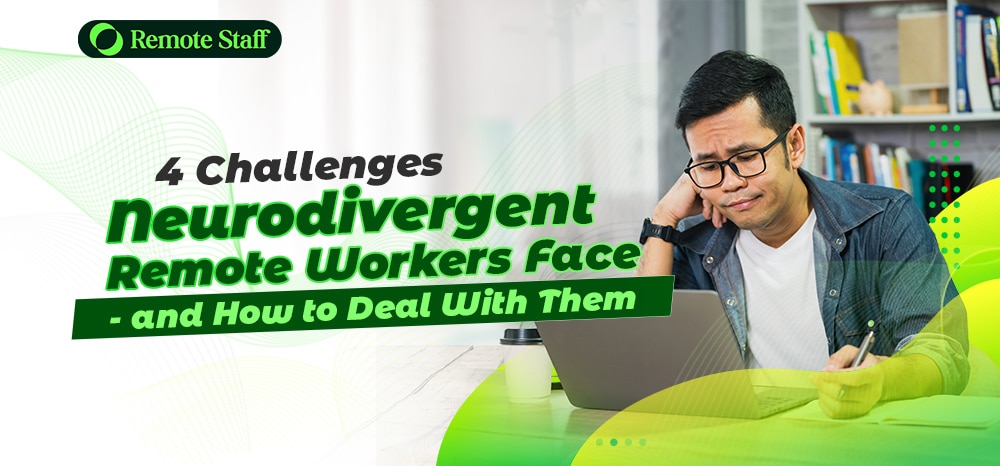Before work from home jobs, neurodivergent individuals struggled to find and maintain office-based jobs. They often faced discrimination early on and lacked access to assistive technology.
All this changed when the pandemic struck, and companies shifted to an online work from home setup.
However, although the remote workplace has given more opportunities for neurodivergent employees, some challenges remain.

What Does it Mean to be Neurodivergent?
In a nutshell, Neurodivergent is a nonmedical term describing people whose brains develop or work differently from a neurotypical person’s. These differences include medical disorders, learning disabilities, and other conditions.
Australian sociologist Judy Singer coined the term “neurodivergent” with its umbrella term “neurodiversity” in 1998.
While it originally only meant individuals with autism, it now refers to any structured, consistent way that brains work differently for a group of people than they do for the majority of others.
Previously, being neurodivergent was seen as abnormal or problematic.
However, scientists now understand that being neurodivergent isn’t inherently a disability.
Because of this shift in thinking, doctors no longer see most forms of neurodivergence as an illness, merely as different methods of learning and processing information.

Types of Neurodivergence
Here are some common forms of neurodivergence:
Autism
Autism is known as a “spectrum disorder” because the needs and traits of autistic individuals vary from one another.
It is a broad set of conditions that may include challenges with socializing, repetitive behaviors, and speech difficulties, leading people to communicate via Alternative Augmentative Communication, typing, writing, or sign language rather than verbally.
ADHD
Attention Deficit Hyperactivity Disorder (ADHD) is an executive function dysregulation disorder, which means individuals may have difficulties managing their thoughts, attention, behaviors, and emotions.
People with ADHD may struggle to stay organized, still, and focused. They also tend to exhibit inappropriate behavior when experiencing strong emotions.
However, thanks to their out-of-the-box thinking, people with ADHD can be great problem solvers, energetic and fun to be with, and sensitive to others’ needs.
Dyslexia
Dyslexia is a form of neurodivergence affecting how you read, speak, and write. It’s usually associated with misreading, writing, or speaking words or letters out of order.
However, dyslexia is more than that.
Some dyslexic individuals confuse certain letters and have difficulty forming sentences, pronouncing words, or following directions.
Although these are the most well-known types of neurodivergence, other kinds include Tourette’s, Down Syndrome, Epilepsy, Dyspraxia, Synesthesia, and Dyscalculia.
Also included here are chronic mental health illnesses like bipolar disorder, obsessive-compulsive disorder, anxiety, and depression.

Common Remote Workplace Challenges for Neurodivergent Workers
In honor of world autism month, here are some common remote workplace challenges neurodivergent employees face – and how they can deal with them.
Staying Focused
A common remote workplace challenge for neurodivergent workers is maintaining focus.
For some, the lack of a structure and numerous distractions at home make it difficult to focus.
On the other hand, others find a regimented office-like environment dull, causing them to procrastinate.
How Do You Deal With This?
The best way to deal with this challenge is through properly setting up your personalized workspace at home.
Choose a quiet location where your family can’t easily interrupt you. You can also use tools like noise-canceling headphones to help you filter out background noise.
For remote PWD workers who struggle with a regular schedule, there are online jobs that offer flexi-time and night shifts.
Hyperfocusing
While some neurodivergent employees struggle to focus on their tasks, others fixate on them excessively. This is called hyperfixation.
This leads to them neglecting other activities they deem unimportant like eating, sleeping, or basic self-care, further blurring the lines between work and personal life.
Hyperfixation also makes them resistant to any changes to their established work routine. This rigid mindset makes it difficult for them to collaborate with their team on important projects.
How Do You Deal With This?
One way to manage your hyperfixation is by establishing a work routine with clear boundaries.
You can also set timers and alarms to help remind you to take a break from your tasks or switch to different ones.
Difficulty Communicating Remotely
One of the most common challenges for many neurodivergent employees in the remote workplace is communicating with their boss and co-workers.
Since most online communication is done via written emails, neurodivergent employees may struggle with discerning sarcasm or reading between the lines, leading to further misunderstandings.
Some neurodivergent employees may struggle to express their thoughts or find the right words to convey their message.
They may also feel overwhelmed by the sheer volume of emails, documents, and messages they receive every day, causing delays in their responses.
How Do You Deal With This?
Don’t hesitate to clarify things if you’re having trouble understanding your boss or co-workers.
Communicate your difficulties with your supervisors and suggest alternatives. For example, you can request video calls or voice messages instead of relying solely on email or written messages so you can refer to non-verbal cues like tone of voice or facial expressions.
You should also practice active listening during virtual meetings to help you better understand your boss and co-workers.
There are also assistive technologies like text-to-speech software or predictive text tools to help express your thoughts more clearly.
Feelings of Isolation
For neurodivergent employees who already struggle with socializing in a traditional setup, the lack of face-to-face interactions in a remote setup can exacerbate their feelings of loneliness and isolation.
Remote work doesn’t present multiple opportunities for small talk like a typical office does. At best, most of your opportunities to socialize with your co-workers happen before or after meetings.
How Do You Deal With This?
Just because you can’t meet your team face-to-face doesn’t mean you can’t socialize with them.
There are plenty of virtual social activities you can attend to get to know your co-workers better, like virtual lunches and online games, for instance.

New Opportunities, New Challenges
Although remote work has greatly improved inclusivity for neurodivergent workers, it also presents new challenges.
Fortunately, by following the tips mentioned above, you’ll have an easier time adapting to a remote setup.
Still looking for work from home jobs? If so, Remote Staff is here to help.
Our jobs list contains plenty of available positions to choose from, ranging from online design jobs to online transcription jobs.
Ready to start your online career? Sign up here. Good luck!

